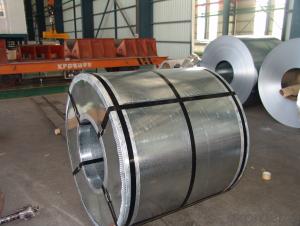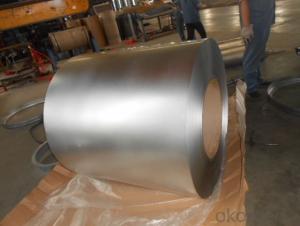GALVANISED STEEL COILS
- Loading Port:
- China Main Port
- Payment Terms:
- TT OR LC
- Min Order Qty:
- -
- Supply Capability:
- -
OKorder Service Pledge
Quality Product, Order Online Tracking, Timely Delivery
OKorder Financial Service
Credit Rating, Credit Services, Credit Purchasing
You Might Also Like
Product Description:
Grade: SGH340, DX51D and SGCC (customized)
Surface treatment: passivation, oiling, chromed, unoiled
Spangle types: minimal, zero and large
Thickness: 0.37 to 3.5mm
Width: greater than 1,000mm
Inner diameter: 508 to 610mm
Zinc coating: greater than 80g/m2
Applications:
Construction, home appliance, hardware and machinery
Standards:
JIS g3302 1998, ASTM a653 2003, EN10142 1990
EN10327 2004, AS1397 2001, GB2518-2004
Packing: export packing/sea worthy for international delivery
- Q:1045 surgical steel.
- There are many ways to sharpen knives. I guess your question is whether to use the steel that comes with knives, or a stone. Steels are only to straighten the edge, which is stropping. They won't sharpen a truly dull knife. For that you need a real sharpening system, of which a whet stone is one. The edge of a knife will get wavy with use - that's what the steel is for, to true it back up.
- Q:I've played guitar for years, now I want a steel guitar. As a beginner, to learn and experiment with, which one would be better for me?
- Pedal steel is very difficult. You need to co-ordinate both hands, both feet and both knees to play it effectively. Lap steel is a lot easier. I suppose it depends how much of a challenge you want. A good lap steel guitar is usually cheaper than a good pedal steel too, so that's another consideration to take into account.
- Q:Can steel coils be coated with aluminum?
- Yes, steel coils can be coated with aluminum. The process is known as the hot-dip method, where the steel is first cleaned and then dipped into a bath of molten aluminum. This results in a protective layer of aluminum coating on the steel surface, enhancing its corrosion resistance and providing aesthetic appeal.
- Q:I don't know why but I'm having a VERY difficult time finding the melting point of 1008 steel.
- 1. okorder 2. Input (melting point 1008 steel) as the search string 3. Check the links; the third one showed the answer in an MSDS
- Q:How are steel coils used in the production of industrial valves?
- Steel coils are used in the production of industrial valves as they are shaped and cut into specific sizes to create the valve bodies and other components. The coils are then processed through various manufacturing techniques such as welding, machining, and forging to form the valve structure. This allows for the production of durable and reliable industrial valves that can withstand high pressure and temperature conditions in various industries.
- Q:What is the lifespan of a steel coil?
- The lifespan of a steel coil can vary depending on various factors such as the quality of the steel, the conditions it is exposed to, and how it is properly maintained. On average, a well-maintained steel coil can last anywhere from 10 to 30 years.
- Q:What are the different coil coatings available for steel coils?
- Steel coils have a variety of coil coatings to choose from, each with its own unique benefits and characteristics. The industry commonly uses the following coil coatings: 1. Polyester coil coatings: These coatings are widely utilized because of their exceptional durability and resistance to fading, scratching, and corrosion. They offer good UV resistance and are available in a wide array of colors. 2. Polyvinylidene fluoride (PVDF) coatings: PVDF coatings are renowned for their outstanding resistance to weathering and UV radiation. They provide excellent color and gloss retention, as well as overall durability, making them ideal for outdoor applications. 3. Polyurethane coil coatings: These coatings offer a high level of flexibility and abrasion resistance. They have excellent chemical resistance and are often employed in industries such as automotive and appliances. 4. Silicone modified polyester (SMP) coatings: SMP coatings are known for their resistance to fading, chalking, and cracking. They provide exceptional weather resistance and are commonly used in architectural applications. 5. Epoxy coil coatings: Epoxy coatings are recognized for their remarkable adhesion and chemical resistance. They are frequently utilized in demanding environments like automotive parts and appliances. 6. Plastisol coatings: Plastisol coatings, which are PVC-based, form a thick and flexible film on the surface of the steel coil. They offer excellent corrosion resistance and are commonly used in the construction industry. These examples illustrate the range of coil coatings available for steel coils. The choice of coating depends on factors such as the intended application, environmental conditions, desired appearance, and required performance characteristics. Seeking advice from a coil coating specialist can help determine the most suitable coating for a specific project.
- Q:What are the different types of coil edge trimming machines?
- There are several different types of coil edge trimming machines available in the market. These machines are specifically designed to trim the edges of coils or rolls of various materials such as metal, paper, plastic, or fabric. Each type of machine has its own unique features and capabilities, catering to different trimming requirements. 1. Manual Edge Trimmers: These machines are operated manually, where an operator manually feeds the coil and trims the edges using a cutting tool or blade. Manual edge trimmers are typically used for low volume trimming applications and require the operator's skill and precision. 2. Semi-automatic Edge Trimmers: These machines have automated feeding mechanisms that assist in feeding the coil through the machine. The trimming process is still performed manually by the operator using a cutting tool, but the feeding mechanism reduces manual effort and increases productivity. 3. Automatic Edge Trimmers: These machines are fully automated and require minimal operator intervention. They are equipped with advanced sensors and controls that enable precise and consistent trimming of coil edges. Automatic edge trimmers can handle high volumes of coils and are often integrated into production lines for continuous trimming operations. 4. Rotary Blade Edge Trimmers: These machines utilize rotary blades to trim the edges of coils. The rotary blades rotate at high speeds, cutting through the material with precision. Rotary blade edge trimmers are commonly used for plastic or fabric coils, as they provide clean and smooth cuts. 5. Guillotine Edge Trimmers: These machines use a guillotine-like cutting mechanism to trim the edges of coils. The cutting blade moves vertically and cuts through the coil material in a straight line. Guillotine edge trimmers are suitable for trimming metal or paper coils, as they provide straight and accurate cuts. 6. Laser Edge Trimmers: These machines use laser technology to trim coil edges. The laser beam precisely cuts through the material, resulting in clean and precise edges. Laser edge trimmers are often used for delicate or high-value materials, as they minimize the risk of damage or distortion. Each type of coil edge trimming machine has its own advantages and limitations, and the choice of machine depends on the specific requirements of the application. Factors such as material type, coil dimensions, trimming precision, and production volume should be considered when selecting the appropriate machine.
- Q:How do steel coil manufacturers handle customer complaints?
- Steel coil manufacturers handle customer complaints by first listening to the customer's concerns and understanding the nature of the complaint. They then investigate the issue thoroughly, often by inspecting the product or reviewing production records. Once the cause of the complaint is determined, they take appropriate actions such as offering replacements, refunds, or repairs. They prioritize open communication with the customer, ensuring that their concerns are addressed promptly and professionally. Additionally, manufacturers may use customer feedback to improve their processes and prevent similar issues in the future.
- Q:How do steel coils contribute to the agricultural machinery industry?
- Steel coils are an essential component in the agricultural machinery industry due to their versatile and durable nature. They are used in various applications and play a crucial role in improving the efficiency and productivity of agricultural machinery. One of the primary ways steel coils contribute to the agricultural machinery industry is through their use in the manufacturing of equipment frames and structures. These frames provide the necessary strength and stability to withstand the demanding conditions of agricultural operations. Whether it is in tractors, harvesters, or tillers, steel coils are used to create sturdy and rigid frames that can handle heavy loads, vibrations, and impacts. Additionally, steel coils are used in the fabrication of components such as plow blades, cultivator tines, and seed drills. These components are crucial for soil preparation, seed planting, and crop maintenance. Steel coils provide the necessary strength and resistance to wear and tear, ensuring these components can withstand the rigors of agricultural operations and last for extended periods. Furthermore, steel coils are also used in the manufacturing of hydraulic systems and other moving parts in agricultural machinery. These systems are responsible for powering and controlling various functions, such as lifting, lowering, and steering. Steel coils provide the necessary strength and flexibility for these systems to function optimally, ensuring smooth and efficient operation of agricultural machinery. Moreover, steel coils contribute to the agricultural machinery industry by enhancing the safety and longevity of the equipment. Steel is known for its excellent resistance to corrosion, rust, and extreme weather conditions. By using steel coils in the construction of agricultural machinery, manufacturers can ensure that the equipment remains durable and reliable even in harsh environments, ultimately reducing maintenance costs and improving the overall lifespan of the machinery. In conclusion, steel coils are an indispensable component in the agricultural machinery industry. Their versatility, strength, and durability make them crucial for the manufacturing of equipment frames, components, hydraulic systems, and other moving parts. By utilizing steel coils, the agricultural machinery industry can produce robust and efficient equipment that can withstand demanding agricultural operations, improve productivity, enhance safety, and extend the lifespan of the machinery.
1. Manufacturer Overview |
|
|---|---|
| Location | |
| Year Established | |
| Annual Output Value | |
| Main Markets | |
| Company Certifications | |
2. Manufacturer Certificates |
|
|---|---|
| a) Certification Name | |
| Range | |
| Reference | |
| Validity Period | |
3. Manufacturer Capability |
|
|---|---|
| a)Trade Capacity | |
| Nearest Port | |
| Export Percentage | |
| No.of Employees in Trade Department | |
| Language Spoken: | |
| b)Factory Information | |
| Factory Size: | |
| No. of Production Lines | |
| Contract Manufacturing | |
| Product Price Range | |
Send your message to us
GALVANISED STEEL COILS
- Loading Port:
- China Main Port
- Payment Terms:
- TT OR LC
- Min Order Qty:
- -
- Supply Capability:
- -
OKorder Service Pledge
Quality Product, Order Online Tracking, Timely Delivery
OKorder Financial Service
Credit Rating, Credit Services, Credit Purchasing
Similar products
New products
Hot products
Related keywords





























